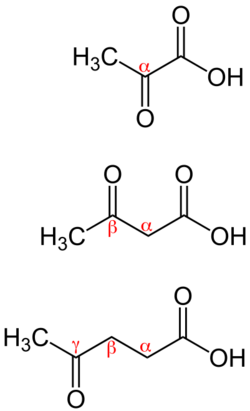Chemistry:Keto acid

In organic chemistry, keto acids or ketoacids (also called oxo acids or oxoacids) are organic compounds that contain a carboxylic acid group (–COOH) and a ketone group (>C=O).[1] In several cases, the keto group is hydrated. The alpha-keto acids are especially important in biology as they are involved in the Krebs citric acid cycle and in glycolysis.[2]
Common types of keto acids include:
- Alpha-keto acids, alpha-ketoacids, or 2-oxoacids have the keto group adjacent to the carboxylic acid. They often arise by oxidative deamination of amino acids, and reciprocally, they are precursors to the same. Alpha-keto acids possesses extensive chemistry as acylation agents.[3] Furthermore, alpha-keto acids such as phenylpyruvic acid are endogenous sources for carbon monoxide (as a gasotransmitter) and pharmaceutical prodrug scaffold.[4] Important representatives:
- pyruvic acid, pervasive intermediate in metabolism.
- oxaloacetic acid, a component of the Krebs cycle.[5]
- alpha-ketoglutarate, a 5-carbon ketoacid derived from glutamic acid. Alpha-ketoglutarate participates in cell signaling by functioning as a coenzyme.[6] It is commonly used in transamination reactions.
- Beta-keto acids, beta-ketoacids, or 3-oxoacids, such as acetoacetic acid, have the ketone group at the second carbon from the carboxylic acid. They generally form by the Claisen condensation. The presence of the keto group at the beta position allows them to easily undergo thermal decarboxylation.[7]
- Gamma-keto acids, Gamma-ketoacids, or 4-oxoacids have the ketone group at the third carbon from the carboxylic acid. Levulinic acid is an example.
Keto acids appear in a wide variety of anabolic pathways in metabolism. For instance, in plants (specifically, in hemlock, pitcher plants, and fool's parsley), 5-oxo-octanoic acid is converted in enzymatic and non-enzymatic steps into the cyclic class of coniine alkaloids.[8]
When ingested sugars and carbohydrate levels are low, stored fats and proteins are the primary source of energy production. Glucogenic amino acids from proteins and/or Glycerol from Triglycerides are converted to glucose. Ketogenic amino acids can be deaminated to produce alpha keto acids and ketone bodies.
Alpha keto acids are used primarily as energy for liver cells and in fatty acid synthesis, also in the liver.
See also
References
- ↑ Franz Dietrich Klingler, Wolfgang Ebertz "Oxocarboxylic Acids" in Ullmann's Encyclopedia of Industrial Chemistry 2005, Wiley-VCH, Weinheim. doi:10.1002/14356007.a18_313
- ↑ Nelson, D. L.; Cox, M. M. "Lehninger, Principles of Biochemistry" 3rd Ed. Worth Publishing: New York, 2000. ISBN 1-57259-153-6.
- ↑ Penteado, Filipe; Lopes, Eric F.; Alves, Diego; Perin, Gelson; Jacob, Raquel G.; Lenardão, Eder J. (16 April 2019). "α-Keto Acids: Acylating Agents in Organic Synthesis". Chemical Reviews 119 (12): 7113–7278. doi:10.1021/acs.chemrev.8b00782. PMID 30990680.
- ↑ Hopper, Christopher P.; De La Cruz, Ladie Kimberly; Lyles, Kristin V.; Wareham, Lauren K.; Gilbert, Jack A.; Eichenbaum, Zehava; Magierowski, Marcin; Poole, Robert K. et al. (2020-12-23). "Role of Carbon Monoxide in Host–Gut Microbiome Communication". Chemical Reviews 120 (24): 13273–13311. doi:10.1021/acs.chemrev.0c00586. ISSN 0009-2665. PMID 33089988. https://doi.org/10.1021/acs.chemrev.0c00586.
- ↑ Kerber, Robert C.; Fernando, Marian S. (October 2010). "α-Oxocarboxylic Acids". Journal of Chemical Education 87 (10): 1079–1084. doi:10.1021/ed1003096.
- ↑ Hewitson, K.S.; McNeill, L.A.; Elkins, J.M.; Schofield, C.J. (1 June 2003). "The role of iron and 2-oxoglutarate oxygenases in signalling". Biochemical Society Transactions 31 (3): 510–515. doi:10.1042/bst0310510. PMID 12773146.
- ↑ Smith, Michael B. (2017), "Functional Group Exchange Reactions" (in en), Organic Synthesis (Elsevier): pp. 137, doi:10.1016/b978-0-12-800720-4.00003-9, ISBN 978-0-12-800720-4, https://linkinghub.elsevier.com/retrieve/pii/B9780128007204000039, retrieved 2022-06-01
- ↑ Leete, E.; Olson, J. O. (1970). "5-Oxo-octanoic acid and 5-oxo-octanal, precursors of coniine" (in en). Journal of the Chemical Society D: Chemical Communications (23): 1651–1652. doi:10.1039/C29700001651. ISSN 0577-6171. https://pubs.rsc.org/en/content/articlelanding/1970/c2/c29700001651.
External links
- Keto+Acids at the US National Library of Medicine Medical Subject Headings (MeSH)
 |
